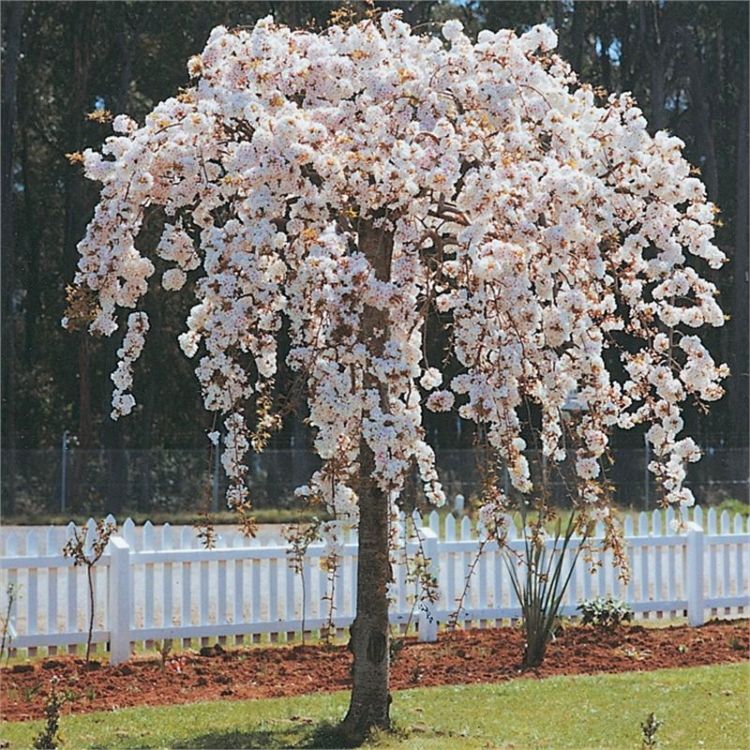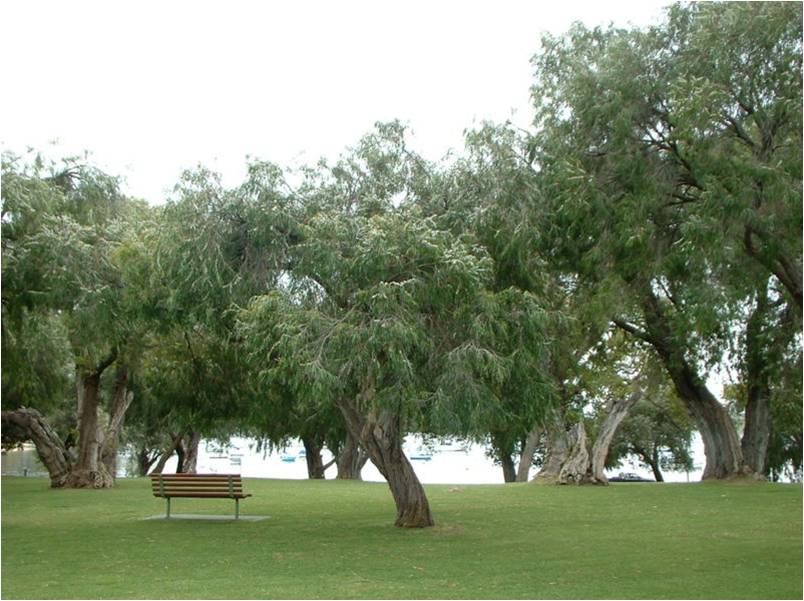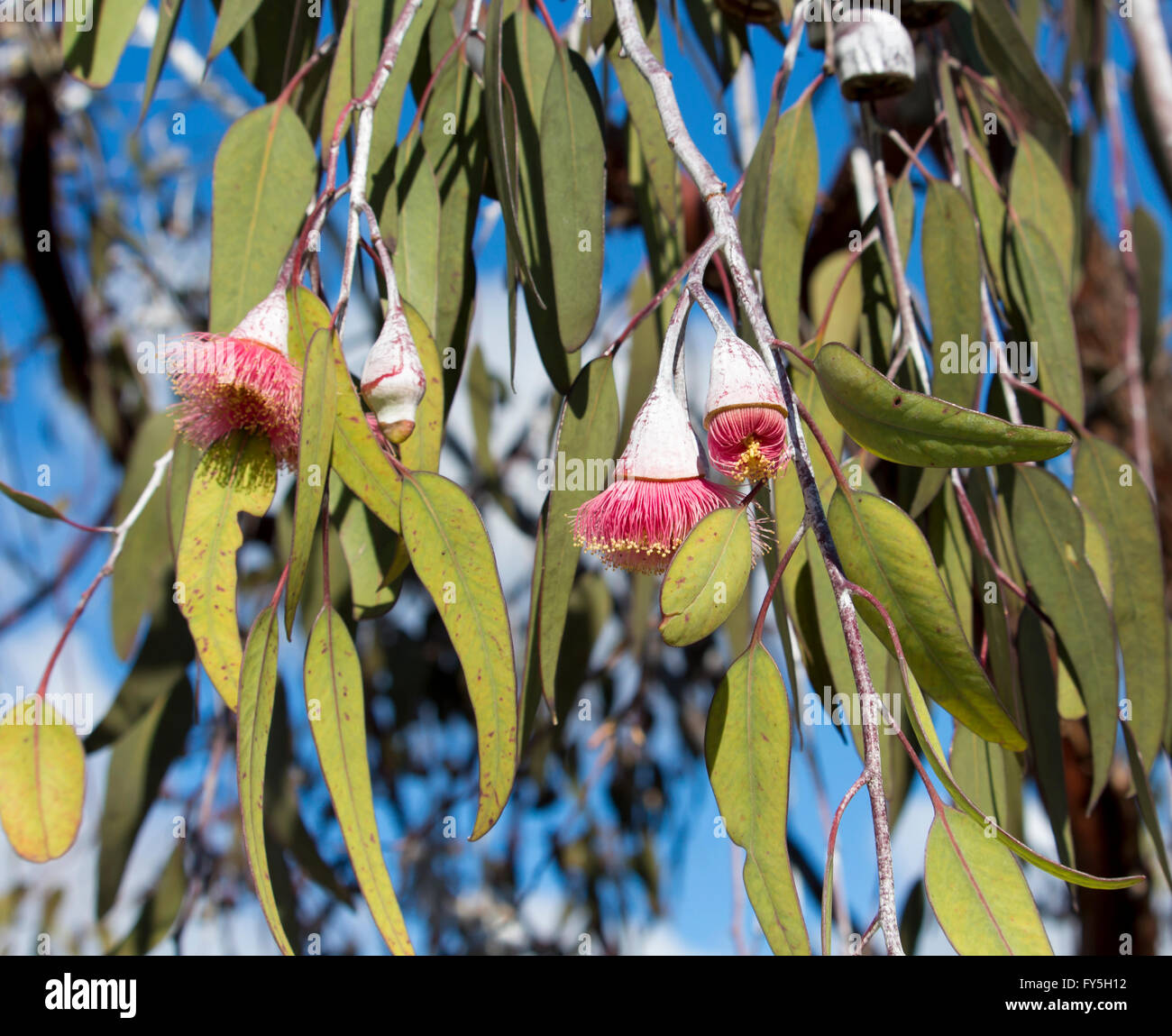
Weeping wattles, Acacia baileyana Australian native plants, Australian native flowers
Willow Myrtle tree Australian pine (beafwood) Fast-Growing Australian Native Trees Gum tree If you're planting a gum tree in your garden, make sure you go for the dwarf variety. Take the lemon-scented gum, which can reach 30m in height. Fortunately, there's a dwarf lemon-scented gum (called 'Scentuous') that reaches just 7m high.

Melaleuca leucadendra (Weeping paperbark) Small trees, Unique trees, Brachychiton rupestris
Agonis flexuosa, also known as the West Australian Weeping Peppermint, is a species of evergreen tree native to Western Australia. It is part of the Myrtaceae family, which also includes other popular species such as eucalyptus and melaleuca. There are several varieties of Agonis flexuosa, including the popular "After Dark" which has dark.

Weeping Acacia Australian native plants, Front garden design, Shade trees
Acacia pendula, commonly known as the weeping myall, [1] true myall, myall, silver-leaf boree, [2] boree, [1] and nilyah, [3] is a species of wattle, which is native to Australia.

Callistemon "Injune". A gracefully weeping Callistemon with… Flickr Australian native
Native flowering trees are the perfect way to bring a little bit of Australia into your backyard. Written by: Steve Kropp Last Updated: December 7, 2023 Aussie natives can be the ideal addition to your garden. They are low maintenance and easy to care for, their flowers are beautiful and their foliage is stunning.

leptospermum brachyandrum weeping tea tree for driveway? Australian garden, Australian native
(ABC Everyday: Nathan Nankervis) Let's start with the big one. There are about 700 types of eucalypts or gum trees (the nickname relates to the sap many exude). They range from frost-hardy snow gums to the coolabahs of the outback.

Willow Myrtle / Peppermint Tree (Agonis flexuosa) tree. Australian native garden, Australian
The beautiful native trees of Australia have been grouped into flowering, fruit, pine, and shade trees. This division simplifies the selection process, allowing you to choose the perfect tree based on whether you're after a stunning ornamental addition, a fruit-bearing gem, or a cooling canopy. Native Flowering Trees

Acacia pendula (Weeping Myall) is a graceful small tree 15 to 30 feet tall. Its silvergrey
In terms of weeping Australian native trees, the Weeping Lilly Pilly will tolerate drought and the occasional over-watering. Glossy, evergreen foliage and clusters of colourful berries make it a popular choice, and some species have attractive bronze or reddish new growth, which adds further visual interest.

weeping mulberry tree australia Eugene England
Fill a clean propagator tray with moisture-retentive seed compost, or sieved compost. Sow seeds thinly across the surface. Cover with a very thin layer of vermiculite to reduce light and retain moisture at the surface. Water well. Leave somewhere warm and bright (25°C), misting every few days if the soil dries out.

Acacia pendula. Weeping Acacia. Nonnative, evergreen tree. Weeping, silver foliage. Good for
Meet the Western Australian Willow Myrtle, also known as the Western Australian Peppermint tree. This medium-sized tree is known for its weeping habit and aromatic leaves. It's a native Australian plant that thrives in various ecosystems, from coastal areas to forests. Why should you consider adding this tree to your garden?

Australian Willow Low maintenance garden, Street trees, Low maintenance garden australian
This Guide to Australian native plants presents detailed information including propagation, cultivation and ecological issues. Australian Native Plants Society (Australia). should generally be pruned after flowering with the exception of C.viminalis and its cultivars which have a weeping habit that can be damaged by pruning. 3. All.

White Weeping Broom Humility, Neatness Australian native garden, Australian native plants
Best Weeping Trees to Grow in Australia 1. Weeping Cherry Tree (Prunus Pendula 'Pendula Rosea') 2. Weeping Hemlock (Tsuga canadensis 'Pendula') 3. Japanese Crimson King (Acer palmatum var. Dissectum) 4. Weeping Larch (Larix decidua 'Pendula') 5. Weeping Birch (Prunus Betula 'Youngii') 6. Weeping Nootka Cypress (Cupressus nootkatensis 'Pendula') 7.

Callistemon viminalis weeping bottlebrush Australian Native Garden, Australian Native Flowers
Acacia pendula is a spreading or erect tree, growing up to 12m high. In its native environment, it often grows in alluvial soils (soils that have been washed into by ancient seas, and consisting of sand, gravel, silt and clay). It is also found in relatively heavy clay soils in Victoria. Its habitat (mainly the western side of the Great.

Natives Trees Tree Nursery Western Australia Mature Trees Advanced Trees Perth
Looking for something unusual as well as small in size? Here's two beautiful petite native trees that are likely known only to connoisseurs and enthusiasts at present. If you have a frost-free garden the little fireball tree ( Asteromyrtus) from Cape York is a pretty choice. We certainly appreciate it in our nursery garden!

Native Australian Weeping Bottlebrush Callistemon Tree with Red Flowers Outdoor with Raindrops
The weeping cherry tree is an ornamental tree bred for its beautiful flowers. They are known as "weeping" trees as they have flexible and drooping branches that get completely covered in pink or white flowers that look like they are weeping from a distance.

Eucalyptus Caesia, silver princess or gungurru, a spectacular small weeping gum tree native to
Standard Grevillea Grevilleas are a long flowering Australian native plant, Standard Grevilleas and Weeping Grevilleas are a great way to incorporate them into many landscape designs. Standardising a plant simply means graft the flowering plant desired onto a strong robust stem, with Grevillea plants this is usually Grevillea robusta.

Leptospermum madidum (Weeping Tea Tree) — Territory Native Plants Australian native garden
General Description: Agonis is a small genus of 4 species all of which occur naturally only in south Western Australia.Recent re-classification of the genus has seen a number of species transferred to other genera (Paragonis and Taxandria). Agonis species range from medium shrubs to medium-sized trees and most are cultivated to some extent. A.flexuosa is by far the most widely grown as it is.